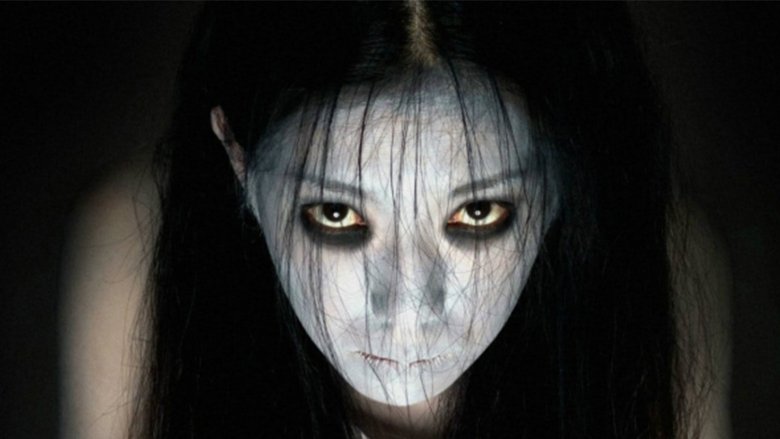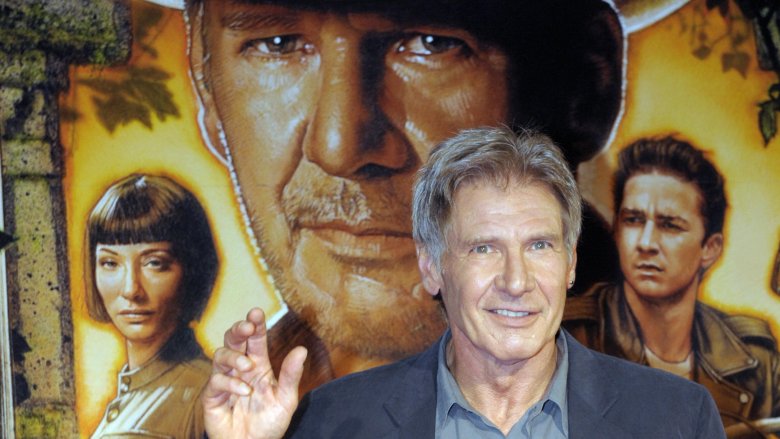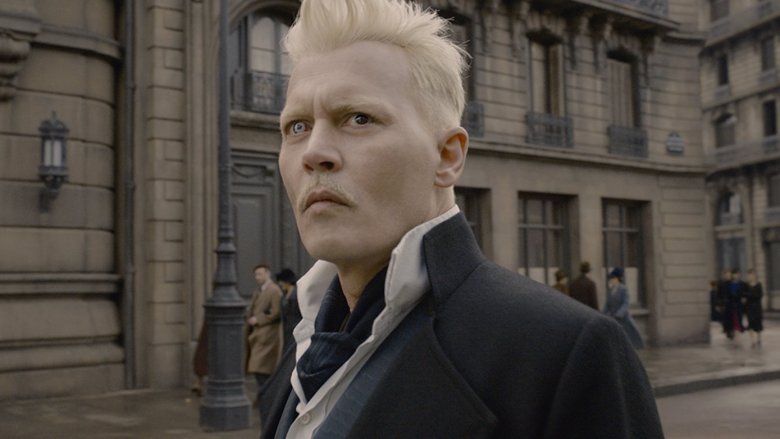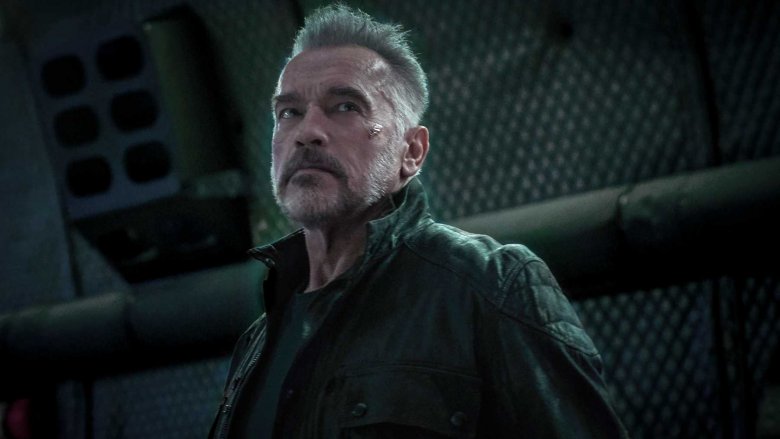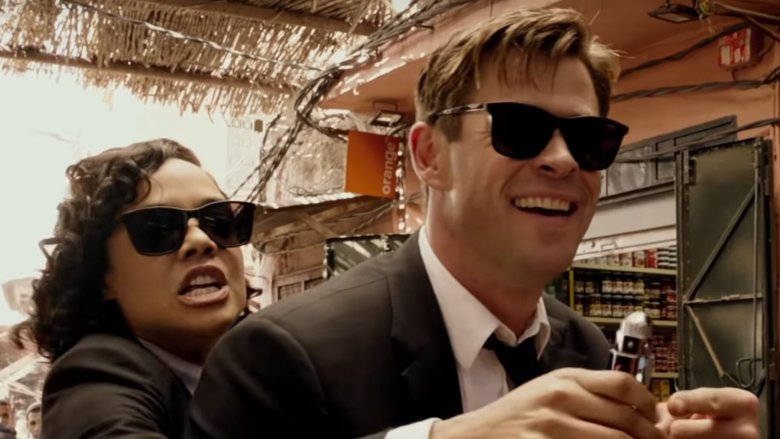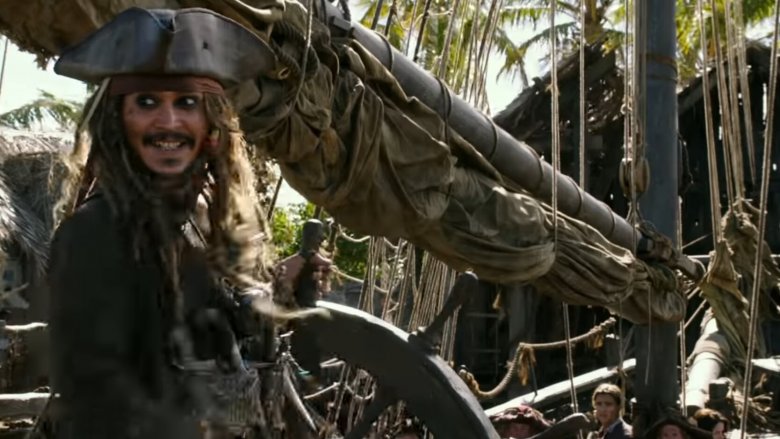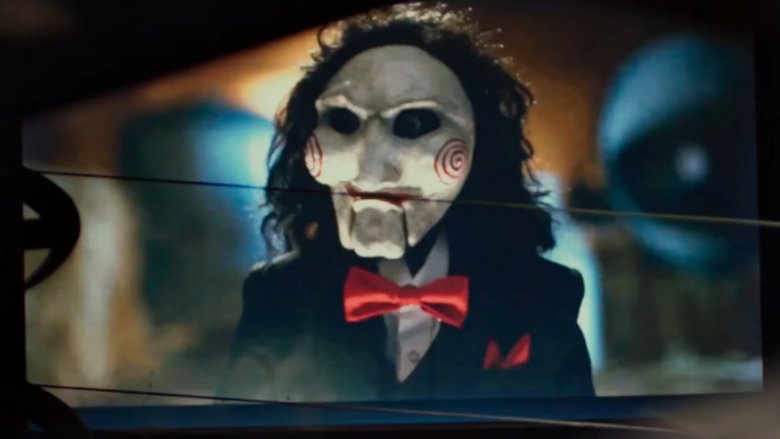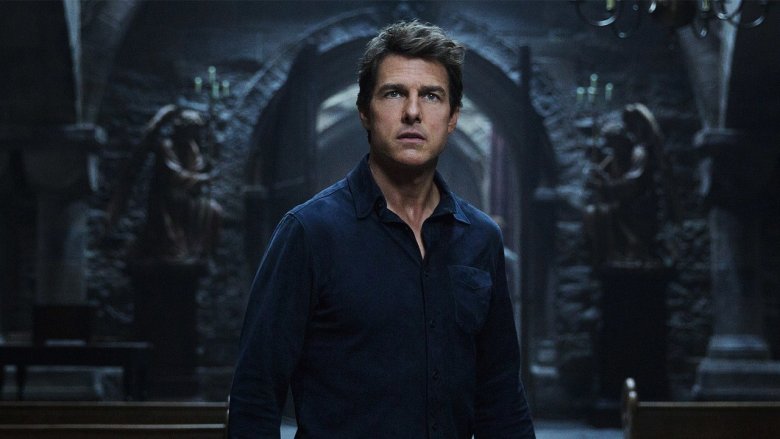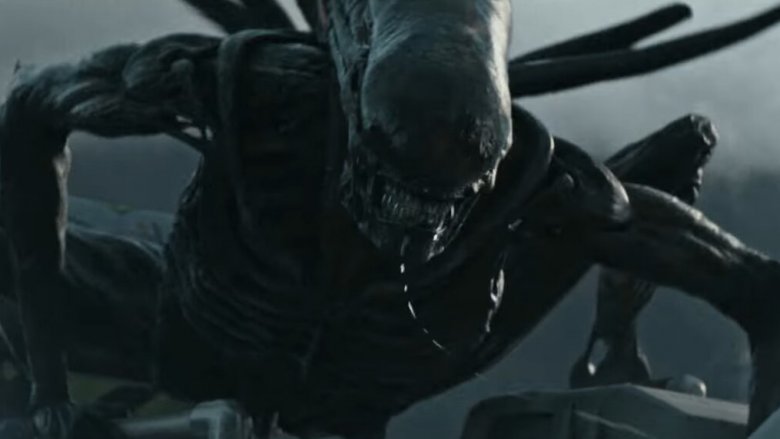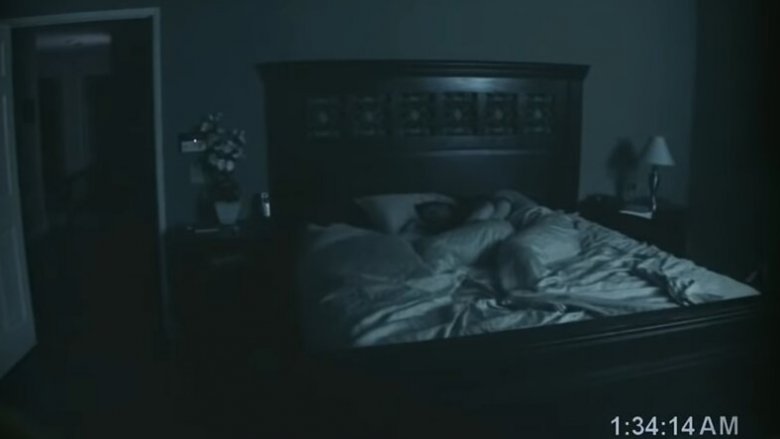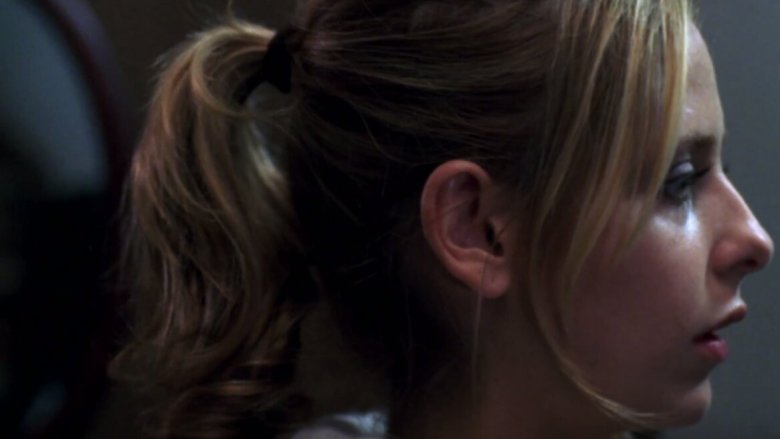Movie Franchises That Just Need To Die
For whatever reputation remakes and reboots have in elitist film circles, Hollywood is fond of them because audiences love them. The numbers don't lie: According to data blog The Droid You're Looking For, there were 122 remakes released theatrically between 2003 and 2012. Using all the production budgets that were available (97 out of those 122), the average box office return on these movies minus their budget was close to $52 million each. Needless to say, remakes work!
Still, Hollywood's tendency towards thrift when it comes to old intellectual property doesn't always lead to great box office. No matter how well a franchise might've performed in the '80s or '90s, sometimes the audience moves on and sometimes the stars don't have the pull they once did. Whatever the reason, there are definitely franchises that ought to be put out to pasture. With that said, here's a look at some franchises Hollywood ought to pull the plug on.
Indiana Jones
Maybe it goes without saying, but Harrison Ford's performances in the first three Indiana Jones movies are some of the most iconic of all time. With the star power he'd established from the Star Wars franchise, Ford was already building the aura of roguish masculinity America associates with him to this day. For just one example, consider the scene in 500 Days of Summer when Joseph Gordon-Levitt's character Tom catches his own reflection in a car window after a successful romantic encounter — lo and behold, Ford as Han Solo looks back at him with a knowing wink.
Still, the Indiana Jones franchise makes less and less sense as time goes on, no matter how you look at it. Using data from Box Office Mojo, the Indy movies have been facing diminishing returns. From Raiders of the Lost Ark to Kingdom of the Crystal Skull, the ratio of money spent to money made has been steadily declining (even if Crystal Skull was the highest-grossing Indy movie of all time). Indy has aged so much that it seems like he should be teaching archeology behind a desk rather than chasing Nazis (or aliens, in the case of Crystal Skull). When the long-mooted fifth installment in the franchise reaches its July 2021 release date, Ford will be nearly 78 — no matter how much we love the guy, there comes a time when you simply have to hang up the hat and bullwhip for good.
Harry Potter
According to a 2017 CNBC report, the Harry Potter franchise is worth an estimated $25 billion between book sales, box office returns, theme park revenue, merchandise, and other assorted tie-ins — and though the first book was published in June of 1997, the Harry Potter universe is still chugging along. In 2016, Fantastic Beasts and Where to Find Them was released as a spinoff of the original franchise, adapted from J.K. Rowling's 2001 fictional textbook of the same name, and the studio plans to turn it into a trilogy of its own (the second entry in the series, Fantastic Beasts: The Crimes of Grindelwald, was released in 2018). Still, making a trilogy out of a non-narrative, world-building book seems a bit excessive — and Crimes of Grindelwald earned a meager 37% critical approval rating on Rotten Tomatoes.
The overall point here is that audiences might be a bit Harry Potter-ed out at this point. Harry Potter has been an impressively pervasive presence in pop culture, but enough is enough. The books in the original series were great, and the original film franchise was too. Beyond that, it might be time to let this saga rest comfortably in the memories of the fans.
Terminator
Terminator and Terminator 2: Judgment Day are stone cold sci-fi classics (with box office returns and critical reception to match). The franchise started getting uneven around Terminator 3: Rise of the Machines, which was generally regarded as competent but forgettable. Unfortunately, everything beyond that has basically been a waste of time and money. Terminator Salvation continued the franchise's post-apocalyptic narrative into a future with CGI Schwarzeneggers running around... and flopped both critically and financially.
After that, Terminator Genisys attempted a partial reboot of the first two films, with a considerably older Arnold Schwarzenegger playing the same character he did in T1 and T2... in an alternate reality as the first two movies, but within the same universe. Perhaps due to of lack of involvement from the original team, Schwarzenegger's fading star power, and all the narrative contortions, Genisys faced a similar fate as Salvation. Regardless, the series is lurching on with Terminator: Dark Fate, this time produced once again by original franchise mastermind James Cameron and reuniting stars Linda Hamilton and Schwarzenegger. All of which is exciting for long-suffering fans as far as it goes, but really — does anyone believe a return to true greatness is still possible for this saga? It's time to let it end.
Shaft
The Shaft franchise was born in a different time. Though the original 1971 film's release had a mixed reception, it has since been called "the most popular of the blaxploitation pictures" by the Chicago Reader and "an efficient cop thriller, with a charismatic performance from [star Richard] Roundtree" by Film4 (via Rotten Tomatoes). Though it had a small budget of only $500,000, it went on to become a smash hit that saved a floundering MGM from going under. It spawned two sequels in Shaft's Big Score! and Shaft in Africa, along with a series of made-for-television movies. After that came a Shaft reboot in 2000, with Samuel L. Jackson taking over the title role as the son of Roundtree's character. Despite the franchise's long layoff, the Jackson-led Shaft performed respectably at the box office, bringing in more than $100 million worldwide against a reported $46 million budget.
Given that, it's easy to understand why a sequel might be appealing to the studio — but it's strange that the next Shaft didn't arrive until 2019, offering a multi-generational story that faced a markedly poor reception from critics. It might come down to a question of timing: Though the first few Shaft movies were edgy and innovative, the franchise feels very much trapped in the '70s in its treatment of women, and while issues of race and class are back in the public discourse, Shaft's blunt and problematic views on race and masculinity don't seem like a great fit for 2019. Rather than trying to bring Shaft into the present, all involved would be better off letting him fade away into retirement.
Men in Black
Who doesn't remember the splash that Men in Black made when it came out? Fueled by the star power of an ascendant Will Smith (and some incredible chemistry with his deadpan co-star Tommy Lee Jones), MiB gave America a wacky sci-fi view of New York City's alien underworld, complete with mind-blowing special effects and a great story. The success of the first entry of course led to a sequel, which was financially successful (to the tune of $441 million in worldwide revenue against a $140 million budget) if critically lackluster. For what it's worth, Men in Black 3 was surprisingly good despite its lukewarm critical reception and marginal cultural impact. At least it was the highest-grossing movie in the franchise to that point, right?
Because of that success, another spinoff/reboot was probably inevitable. Still, without the original cast to support it, 2019's Men in Black: International went down in flames with critics and at the box office. Unfortunately, many of the things that made the first MiB great don't carry the same weight now — namely the then-innovative special effects, offbeat humor, and irresistible star power. They just don't make mega-stars like they used to, and new entries to this franchise are beginning to feel like watching an old dog do old tricks.
Pirates of the Caribbean
When Pirates of the Caribbean: Curse of the Black Pearl came out, nobody knew what to expect — after all, the movie had been adapted from (or at least inspired by) a Disneyland theme park ride. Despite those unlikely origins, it became a massive success, grossing $654 million and revitalizing Johnny Depp's career, the swashbuckling genre, and summer blockbusters all in one fell swoop. The first few sequels that followed, namely Dead Man's Chest and At World's End, were fun — and earned a cool two billion dollars between them worldwide. Still, the movies' declining critical reception proved there was blood in the water from that point onward.
The series started out with promise partially because of Disney's oddball source material, the writers' and producers' choice to wade into a risky genre, and Depp's decision to play Captain Jack Sparrow so flamboyantly. The fusion of the supernatural into a pirate movie was inventive as well, and the special effects are uniformly great throughout the franchise. Still, without any considerably new additions to the series, each new entry has felt more and more derivative. Though there may be at least one more film coming down the pike, difficulties around a flailing reboot attempt suggest that this franchise might be better off marooned.
Saw
As is the case with so many great franchises, the first Saw movie debuted with a bang. It all began as an Australian short film directed by James Wan and written by his screenwriting partner Leigh Whannell. It was designed to be a proof of concept for a script, and was made for only $5,000 AUD. Wan and Whannell's plan worked, and their short was adapted into a feature film with a reported budget around $1.2 million that featured ingenious death traps, a diabolical puppet, and a huge twist that nobody saw coming. As everyone now knows, Saw was an enormous success that made more than $100 million worldwide, spawned the hottest horror franchise since Final Destination, and turned Wan and Whannell into industry moguls.
Though dismissed by critics, Saw, Saw II, and Saw III all fared well with moviegoers and expanded the franchise's universe in ever more twisted and interesting ways. Around Saw IV, the gore and the elaborate deaths started becoming more distasteful than disturbing, and by Saw V the audience had seen virtually all the tricks the franchise had up its sleeves. Still, up next were Saw VI, Saw 3D, and even the spinoff/reboot Jigsaw. These last three were huge financial successes, earning a combined $306 million worldwide (despite costing only $41 million to make all three). Still, the franchise has now gone the way of most great horror franchises: deep into the waters of self-parody. Although the prospect of a looming reboot starring Chris Rock and Samuel L. Jackson is bizarre enough to pique the audience's interest, enough is enough at this point.
The Mummy
Unlike most of the franchises on this list, the 2017 version of The Mummy starring Tom Cruise is actually a reboot of a reboot. The first film in the series was the 1932 movie starring Boris Karloff, and was one of Universal Studios' many "creature features" from the same period. The first reboot from 1999 is the one most often referenced today, which starred a young Brendan Fraser and Rachel Weisz in a special-effects laden action-adventure that was a smash hit financially and spawned its own sequels and spinoffs (namely The Mummy Returns and the critically lambasted Scorpion King, which spawned its own direct-to-video sequels).
There's no denying that Tom Cruise is one of the last true remaining international movie stars, and he gave the 2017 reboot his all as he always does — no matter how old he gets. Still, the story of The Mummy is going on 100 years old by now, and although the new version was supposed to pave the way for Universal's classic monsters to unite in a new cinematic universe, the result instead was a box office flop with reported losses of $95 million. Whether it's because these stories are no longer relevant to audiences or because Cruise's control over production allegedly thwarted director Alex Kurtzman's creative vision, it's probably safest to leave this franchise in the catacombs.
Alien
Financial success is one thing — in fact, it often seems like it's the only thing for some studio execs — but the Alien franchise is also esteemed for its artistic achievements. The original, directed by Ridley Scott, has gone down in history as not just a classic of sci-fi horror, but was even added to the National Film Registry for being "culturally, historically or aesthetically significant." Though there's no topping the first one, the second Aliens got even better reviews than the first — and made even more money. Like so many franchises before it, the third entry is where things started to go wrong.
Alien 3 was panned by critics when it came out and generally derided as an example of style over substance. Alien: Resurrection didn't fare much better, and the franchise was presumed dead until a prequel series was announced with Scott attached. Though Scott's talents earned Prometheus and Alien: Covenant better receptions than the third and fourth entries, neither were huge financial successes and both were far from the spirit of the originals. In this case, the later films do more to obscure the original mythology than to elucidate it. Though much respect goes to Scott for his latest efforts, it may be time to seal this franchise in a pod and jettison it from the ship.
Paranormal Activity
Paranormal Activity had a few things going for it when it first came out. For starters, the budget was extremely low and the style was intimate and stripped down. For another, the marketing campaign was killer and the initial reviews were outstanding. Last but not least, the in-theater experience was terrifying. All of this translated to a recipe for the most profitable film ever made, based on return on investment: Though it cost only $15,000, it made more than $193 million worldwide.
Anytime a film has that kind of runaway success, it's a virtual guarantee that sequels will follow. Since 2009, there have been seven American Paranormal Activity films and even one Japanese one, Paranormal Activity 2: Tokyo Night (this despite the fact that there was already a Paranormal Activity 2). Though it goes without saying, the franchise has been enormously successful financially, to the tune of around $890 million in worldwide revenue, even if critical reception has been in steady decline. Beyond the figures, it's hard to get around the fact that this is mostly a franchise based on a few cheap tricks that are hard to either repeat or innovate around. Despite that, there's been discussion of rebooting the franchise anyway. Unless it's a complete reinvention, it's hard to imagine that it'll be worth the effort.
The Grudge
When J-Horror American remake wave began with Gore Verbinski's hugely successful The Ring and swelled further with the The Grudge, a Sam Raimi-produced iteration of the Japanese film Ju-On. While the Ju-On franchise is still going strong in Japan (with nine Japanese productions and more to come), its American version was shorter lived. Even though the first entry in the American series didn't do well with critics, it made a splash at the box office by raking in $187 million on a $10 million budget. After that came two more sequels in The Grudge 2 and The Grudge 3, with diminishing returns both financially and critically.
Even if horror often gets a bad reputation with critics, and even if American audiences weren't totally equipped to interpret the tropes and themes of J-Horror, it was still hard to get behind this franchise even when J-Horror remakes were at their most popular. Still, it's hard for a studio to let go of a recognizable brand: Deadline announced an American reboot of The Grudge due in 2020, and Variety has posted even more recent updates. It's hard to imagine what the filmmakers could bring to the series at this point. J-Horror adaptations have come and gone in American cinema, yet The Grudge is apparently going to live on. Best of luck, gents, but it may have been wiser to lay this one to rest.
